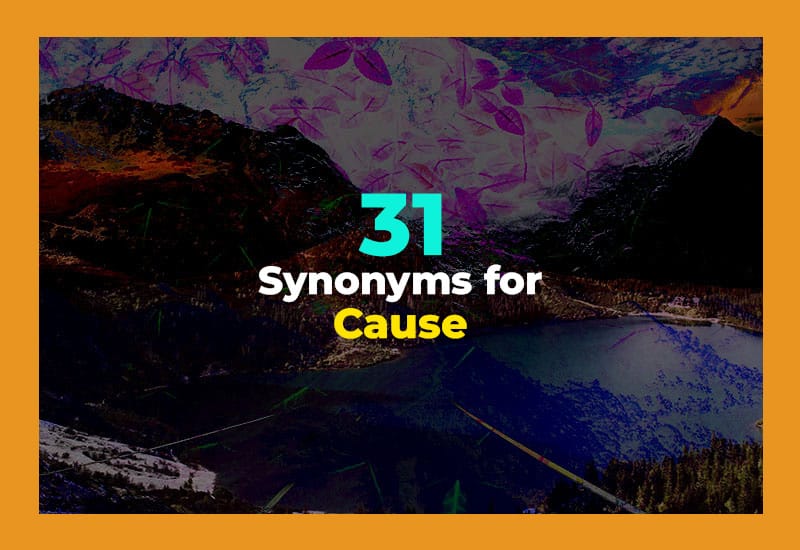You know how sometimes finding the right word makes explaining things so much easier? Whether you’re talking about why something happened or what started it all, using different words like reason, trigger, or origin can make your speech or writing more interesting. Let's dive into some fun and easy synonyms for “cause” that you can use every day, complete with simple examples to help you understand each one better!
1. Reason
Reason is a very common word to explain why something happens. It tells the "why" behind an event or action. For example, “The reason I was late was the heavy traffic.” This word is used when you want to explain the cause in a simple and clear way. Whether it's a small problem or a big decision, "reason" helps others understand your thinking. It's friendly and easy to use in almost any situation, making it a perfect choice to describe causes.
2. Source
Source means where something begins or comes from. For example, “The source of the river is high in the mountains.” It's often used to describe the starting point of things like water, information, or problems. Saying "source" points to the origin or root of a cause. This word helps when you want to focus on the place or person where something started. It's a great word for explaining causes in nature, news, or ideas.
3. Origin
Origin means the beginning or birth of something. For example, “The origin of the tradition goes back hundreds of years.” It explains where something started or first appeared. Using "origin" is helpful when talking about history, cultures, or natural events. It points to the cause as the very first place or time something happened. This word sounds a bit formal but is clear and useful when describing causes that have a story behind them.
4. Root
Root means the basic cause or foundation of a problem or situation. For example, “The root of their argument was a misunderstanding.” It shows what lies beneath the surface. When you talk about the root cause, you're pointing to the real reason something happened. This word is strong and easy to remember. It's often used in discussions to get to the heart of an issue, helping to find solutions by understanding the base cause.
5. Motive
Motive means the reason someone does something, usually a feeling or idea behind it. For example, “His motive for helping was kindness.” It's often used when talking about actions, especially in stories or crimes. Saying "motive" tells why a person acted in a certain way. This word helps explain causes related to behavior and choices. It's good for showing that causes can be inside someone's mind or feelings, not just outside events.
6. Motivation
Motivation means the drive or desire to do something. For example, “Her motivation to study came from wanting a good job.” It's a positive word that shows why people act or work hard. Motivation is the cause that pushes someone forward. This word is often used in personal growth or work situations. It helps explain causes related to energy and goals, showing the internal force behind actions.
7. Trigger
Trigger means something that starts an action or event quickly. For example, “The loud noise was the trigger for the alarm.” It's like a button that causes something to happen right away. Saying "trigger" shows a cause that happens suddenly or unexpectedly. This word is useful for events or feelings that begin fast, like memories, actions, or problems. It makes the cause sound clear and direct.
8. Stimulus
Stimulus means something that causes a reaction or response. For example, “The bright light was a stimulus for the plants to grow.” It's often used in science or psychology to explain what makes things change or move. Saying "stimulus" shows a cause that encourages action or growth. This word helps when talking about natural or physical causes that create change. It's useful for clear, cause-and-effect explanations.
9. Impulse
Impulse means a sudden urge or desire to do something. For example, “She bought the dress on impulse without thinking twice.” It's a quick cause inside a person's mind or heart. Saying "impulse" shows a cause that is spontaneous and not planned. This word is good for describing sudden feelings or decisions that lead to action. It helps explain causes related to emotions and quick reactions.
10. Basis
Basis means the foundation or main reason for something. For example, “The basis of their agreement was trust.” It shows what everything is built upon. Saying "basis" points to the cause that supports or explains an idea, rule, or action. It's often used in logical or serious talks. This word helps clarify causes that are stable and important to understanding the whole situation.
11. Foundation
Foundation means the solid base or start of something. For example, “Education is the foundation of a successful career.” It shows what supports or causes growth. Saying "foundation" points to a cause that is strong and essential. This word is good for talking about causes that build or support something important. It helps show how causes create lasting effects.
12. Factor
Factor means one part or reason among others that causes something. For example, “Weather was a factor in the game's delay.” It shows a cause that contributes but might not be the only one. Saying "factor" helps explain causes when many things work together. This word is useful in science, business, and everyday talk when you want to list causes clearly.
13. Influence
Influence means the power to affect or change something. For example, “Her teacher's advice had a big influence on her career.” It's a cause that shapes actions or decisions. Saying "influence" shows a cause that works gently or over time. This word helps explain causes related to people, ideas, or events affecting others. It's great for describing soft or indirect causes.
14. Determinant
Determinant means a factor that decisively causes an outcome. For example, “Access to education is a key determinant of success.” It shows a cause that strongly controls what happens. Saying "determinant" helps explain important causes that decide results. This word is often used in science or statistics. It points to causes that are critical for understanding why things turn out a certain way.
15. Grounds
Grounds means the reasons or justification for something. For example, “They had grounds to believe the story was true.” It's a formal word for the cause behind decisions or actions. Saying "grounds" helps explain causes that support opinions or rules. This word is useful in legal or serious conversations when you want to explain why something is fair or right.
16. Justification
Justification means the explanation or reason that proves something is right or fair. For example, “She gave a strong justification for her choice.” It shows a cause that defends or supports an action. Saying "justification" helps explain causes that convince others. This word is common in arguments or formal talks. It makes the cause sound reasonable and acceptable.
17. Occasion
Occasion means the event or reason that causes something to happen. For example, “The wedding was a happy occasion for the family.” It shows the cause as a specific time or event. Saying "occasion" helps explain causes related to special moments or celebrations. This word is often used to describe the cause of joyful or important events.
18. Catalyst
Catalyst means something that causes a quick or important change. For example, “The new law was a catalyst for reform.” It shows a cause that speeds up action or change. Saying "catalyst" helps explain causes that bring sudden or strong effects. This word is common in science and social change. It's great for describing causes that push things forward.
19. Incitement
Incitement means the act of causing someone to do something, often negative. For example, “The speech was an incitement to protest.” It shows a cause that provokes or urges action. Saying "incitement" helps explain causes that start strong reactions, usually in people. This word is often used in legal or political contexts.
20. Provocation
Provocation means something that causes anger or annoyance. For example, “His rude comment was a provocation that upset her.” It shows a cause that leads to emotional reactions. Saying "provocation" helps explain causes that start conflict or irritation. This word is useful when describing causes related to feelings or fights.
21. Spark
Spark means a small cause that starts something bigger. For example, “The argument was the spark that started the fight.” It shows a cause that triggers a bigger event or reaction. Saying "spark" helps explain causes that begin chains of events. This word is informal and vivid, great for storytelling or everyday talk.
22. Instigator
Instigator means a person or thing that causes an action or event. For example, “He was the instigator of the prank.” It shows the cause as a person who starts something. Saying "instigator" helps explain causes that come from people's actions. This word is often used when someone begins trouble or excitement.
23. Driving force
Driving force means a cause that motivates or pushes action. For example, “Passion was the driving force behind her success.” It shows a cause that moves things forward. Saying "driving force" helps explain causes related to energy and motivation. This phrase is great for describing powerful causes in stories or real life.
24. Incentive
Incentive means something that encourages action or effort. For example, “The bonus was an incentive to work harder.” It shows a cause that motivates behavior. Saying "incentive" helps explain causes related to rewards or benefits. This word is common in business or education. It highlights positive causes.
25. Inducement
Inducement means something that persuades or causes someone to act. For example, “The free gift was an inducement to buy the product.” It shows a cause that encourages a decision. Saying "inducement" helps explain causes related to persuasion or influence. This word is formal and often used in marketing or law.
26. Pretext
Pretext means a false reason used to hide the real cause. For example, “He left the meeting on the pretext of illness.” It shows a cause that is not true but used as an excuse. Saying "pretext" helps explain causes that cover the real motive. This word is useful when talking about hidden causes or lies.
27. Instigation
Instigation means the act of causing something to happen, especially trouble. For example, “The instigation of the protest led to a big crowd.” It shows a cause that starts events or actions. Saying "instigation" helps explain causes related to beginnings or provocations. This word is often used in serious or formal talks.
28. Prompt
Prompt means a cause that makes something happen quickly. For example, “The question prompted him to think deeply.” It shows a cause that encourages immediate action or thought. Saying "prompt" helps explain causes related to quick reactions. This word is useful in many situations where causes lead to fast results.
29. Intention
Intention means the plan or aim behind an action. For example, “Her intention was to help, not to hurt.” It shows the cause as a person's purpose or goal. Saying "intention" helps explain causes related to plans and decisions. This word focuses on the reasons inside people's minds.
30. Aim
Aim means the goal or purpose of an action. For example, “The aim of the project is to reduce waste.” It shows the cause as what someone wants to achieve. Saying "aim" helps explain causes related to objectives or plans. This word is clear and simple, often used in goals and projects.
31. Goal
Goal means the desired result or cause of effort. For example, “Her goal was to finish the race on time.” It shows the cause as the reason behind hard work. Saying "goal" helps explain causes related to ambition and success. This word is positive and common in many situations.

Final Thoughts
Exploring different words for "cause" can make your communication clearer and more interesting. Whether you talk about reasons, origins, or motivations, each synonym brings a special shade of meaning. Using words like "trigger," "motive," or "foundation" helps you explain causes in a more fun and detailed way. So next time you want to explain why something happened, try one of these words to spice up your language and get your message across better!









